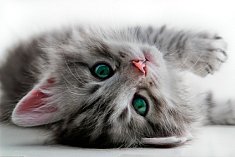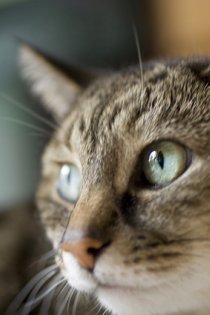|
Common Elderly Cat Health Problems
The most common elderly cat health problems are cancer, dental disease, hyperthyroidism, kidney disease, inflammatory bowel disease, obesity, heart disease, diabetes and arthritis.
Senior Cat's Health Concerns
Cancer is the number one elderly cat health problem that causes death in older cat. Symptoms include difficulty breathing, difficulty eating, loss of appetite, weight loss, o abnormal swelling, and sores that don't heal. Treatment varies depending on the location of the tumors and the type of cancer. A biopsy is needed to confirm and determine the type of cancer. Treatment usually includes chemotherapy or radiation therapy. Surgery is also a option for older cats, but some veterinarians may recommend against it if the cat is too weak.
Treatment includes a professional dental cleaning that is completed by your veterinarian. During the cleaning, which requires anaesthesia, your vet will remove tartar and plaque off of your cat’s teeth. If needed your vet will also extract any teeth that have decayed or are infected. It is also important to regularly check your cat’s teeth and gums and to brush them or use a commercial product to prevent and remove tartar.
Treatment may include a strict diet regime low in protein, supplemental fluids, potassium supplementation, and medication to minimize anemia and to prevent further damage to the kidneys. To find out more about how kidney disease affect cats and different treatment options read Symptoms And Treatments Of Feline Kidney Disease.
If left untreated, arthritis can eventually lead to complete immobility. Treatment includes dietary supplements, fish oils with omega-3 fatty acids and other alternative methods like acupuncture and acupressure.
Symptoms can include watery eyes, eye discharge, cloudy eyes, bulging or sunken eyes, pawing at the eyes, or abnormal eye movements. Depending on the type of illness, eye conditions can be treated with antibiotics or surgery.
Tips For Caring For An Elderly Cat
As owners of a healthy senior cat, we have had to make changes over the years to accommodate or aging cat as she entered and lives through her golden years. As cats age they begin to slow now, and may experience difficulty jumping, running and climbing. It's important to make sure that their litter box, food and water aren’t in a location where they have to climb too many stairs or jump, like some of those designer cat litter boxes require. Another elderly cat health problems that we noticed that our senior cat developed was the deterioration of her vision, which made it difficult for her to see when all the lights were off at nights. To help her see better when she is using the litter, eating or drinking at night, we bought night lights and plugged them in. Although senior cat's may not be as interested in play as they were as kittens, playing still helps to keep their bodies healthy and lean. We have simply shorten the play times and play with toys that do not require jumping, just a bit of chasing, once she is tired she indicates this by laying down. It is also very important to have a regular dental hygiene routine with your senior cat, they have an increase chance of having tartar and plaque build up due to their age. If your cat won't allow you to brush their teeth, which some cats simply won't, then there are commercial products such as gels and liquid that helps to remove plaque and tartar build up without brushing. Annually take your senior cat, or cats at any stage of life, to the vets for their check up, sometimes the vet catches health problems that we miss, and it is always better to find out a elderly cat health problem in the early stages.
Similar Topics
How To Treat And Prevent Worms In Cats - Discussing worms in cats treatment and prevention.
Feline Lymphoma: Causes, Symptoms, Treatment - Discussing the causes, symptoms and treatment of feline lymphoma
Feline Herpes Virus: Causes, Symptoms, Treatments - Discussing the causes, symptoms and treatments of feline herpes virus.
Feline Eye Infection: Causes And Effective Treatments - Discussing different types of feline eye infections, causes and treatment options.
Feline Ear Mites: Causes, Symptoms, Treatments - Ear mites can be very uncomfortable to your cat, learn about the symptoms to be aware of and different treatment options.
Feline Seizure: Causes, Signs, Treatments - Feline seizures can be very scary for both you and your feline friend. This article discuss causes, important signs to be aware of and treatments. Feline Constipation: Causes, Symptoms And Treatment Options -Feline constipation can be both uncomfortable and painful for your cats, read to find out causes, symptoms and different treatment options.
Return From Elderly Cat Health Problems To Cat Health Home Page
|
Protect Your Pet Card
In Case Of An Emergency The Protect Your Pet Card Lets Emergency Services Know That You Have Pet/Pets Waiting For You At Home, Making Sure That Your Pets Are Cared For.
Get Your Card Today!
Win A Free $250 Petsmart Gift Card For Your Cat!
Must Be A US Resident
Click Here To Easily Enter For Your Chance To Win.

"There are few things in life more heartwarming than to be welcomed by a cat."







